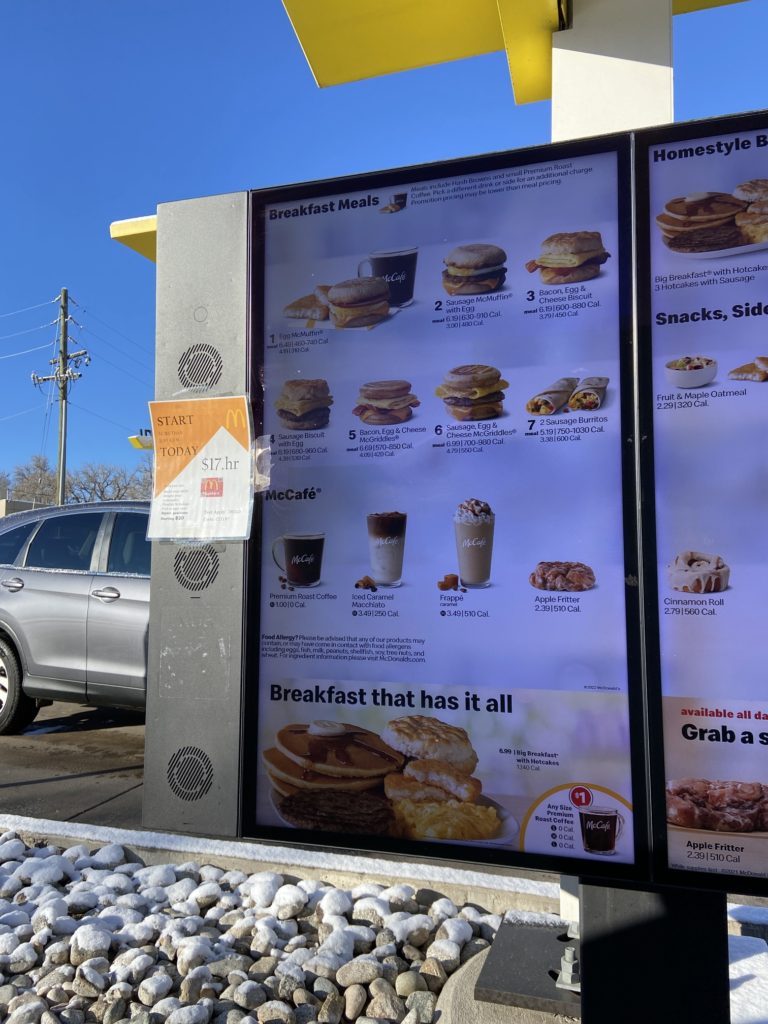Also written by Olivia Fendrich and Brenna Regan.
It’s been clear for the past couple of months that service industries, like retail and food service, have been severely affected by understaffing. Pretty much everywhere is hiring and you’ve probably had to wait longer to get whatever you need because of the lack of staff.
Currently, the unemployment rate in Colorado is around 5.1%. The fear of getting sick or exposed in addition to unsuitable working conditions of minimum wage-paying jobs are resulting in many adults relying on unemployment benefits to maintain their income instead of working.
For students who work, it’s not been easy to cope with this issue. They are often asked to do more than their job description includes or stay longer and cover more shifts if people get sick due to COVID.
“I would be trying to do trigonometry homework while bagging up orders.”
Junior Dylan Hoover began working at Chili’s in March of 2021, and faced considerable difficulty balancing work and school.
“The restaurant industry, since COVID, has been highly affected with employment and being understaffed, so they kind of take advantage of the staff that they have sometimes,” said Hoover.
Although a job providing many hours can be extremely helpful during the summer months and breaks during the school year, there are many students who work 35+ hours during regular weeks which distracts from school. Studies have shown that grades will drop in both high school and university level students if they work more than 20 hours a week.
“I left Noodles & Company because they kept scheduling me for 12-hour shifts multiple days in a row. There was a week where they scheduled me for five closing shifts in a row that started while I was at school,” said senior Mikey Johnson.
Not only was Johnson receiving less than minimum wage in his hourly salary, but he was also earning less than the average food preparation worker.

Even if students don’t rely on a job to support themselves and their families financially, it’s still extremely frustrating and difficult to have so much responsibility placed on them, as well as staying longer or picking up extra shifts to compensate for other people’s illnesses. It’s almost as if students are being punished for their loyalty.
“I definitely work a lot more than I want to, especially recently, because we don’t have a lot of hosts…we haven’t been able to find people to cover shifts and so especially with COVID, we have so many people that are sick. The last few weeks have been very stressful,” said senior Lucy Girkin.
The concerning lack of workers is due largely to The Great Resignation, an economic phenomenon in which many workers in the retail, restaurant, and hospitality industries quit their jobs to find better or higher paying employment.
“I’m in IB, so [working] and IB was a lot last semester,” said Hoover. “I told them that I was gonna quit if they didn’t change the hours, because it was just too much.”
Hoover isn’t the only one who became fed up with their employer’s treatment.
“We were so understaffed that underage people like me were having to miss school,” said junior Rianna Valdez.
“It’s not my job to try and fix an entire company. It’s not my problem,” said Valdez.
The complaints of unjust working conditions coincide with the King Soopers strike, in which workers across the metro area striked for better wages and employment conditions. Individuals working entry-level positions are feeling extortionate pressure and are unwilling to continue tolerating such harsh standards.
“I’ve definitely done extra bussing and even if I’m still a host, the duties of a host have expanded, like bringing food to other tables…We technically get below minimum wage with tips but I definitely think just because the amount of work we’ve had to do, we should get paid more,” said Girkin.
Although high school students might not rely on a job for severe financial help for themselves or their families, many are still doing more than what has been asked of them in the past and getting paid minimum wage for it. Why would high school students want to stay at a job where they are working more and getting paid the minimum for what they do?
“We didn’t have enough people and we were still getting paid minimum wage. We felt so underappreciated,” said Valdez.
High school students, such as Hoover, Girkin, and Valdez, often have so much more going on in their lives that causes them to not work as much as their employers need them to, but they feel like they should be working more or doing more because their employers simply need them.
“I go from one thing to the next to work and it puts a lot of stress on me, especially working doubles on weekends which is what I’ve been doing,” said Girkin.
They shouldn’t have to sacrifice sports, activities or their education for working, but when wages are low and many employees are asked to do more than before the pandemic, why wouldn’t more people try to find new jobs that don’t put them at risk of COVID?
If you are struggling with a similar situation at your workplace, don’t be afraid to advocate for yourself and the rights you have as a minor that is working. It’s unclear when the understaffing issue will resolve itself (or be resolved), but for the time being, it’s important to stay on top of the situation at your workplace and how you might be getting treated worse than your adult colleagues.
